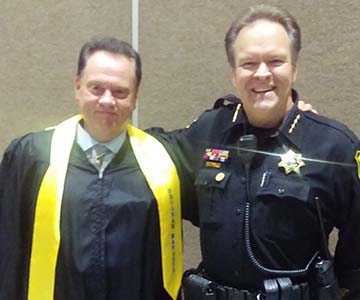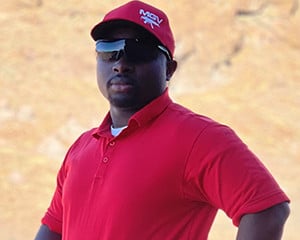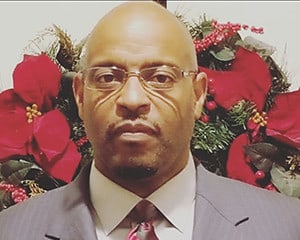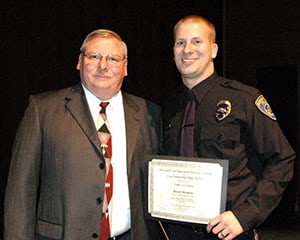A criminal justice career attracts those looking to give back
 Criminal Justice: Corrections Program Director Donald Martin sums up the motivation for many of those who come to SJVC’s Modesto campus to explore a career in law enforcement.
Criminal Justice: Corrections Program Director Donald Martin sums up the motivation for many of those who come to SJVC’s Modesto campus to explore a career in law enforcement.
“A lot are drawn to this field who watch reality shows (crime) and get that adrenaline rush,” he explains. “Some seek to improve their self-esteem. Others are altruistic and want to help society. The best students tend to have a balance between all the categories – a little of that excitement motive, a little altruism and they want to make a mark in the world.”
The important element is balance. If a Criminal Justice Corrections (CJC) student’s career vision is weighted in any one area, it is Donald Martin’s – and any other CJC faculty member’s responsibility – to provide perspective.
“I call it the ‘CSI Effect’, says Donald. “A lot of students think they’re going to work in an action or reality show. I give them a reality check. Being in the CIA or a Probation Officer sounds cool, but in the movies, they never do any paperwork. In reality they might write 22-page biographies all day. And a decomposed body; they will never forget the smell. I open a lot of eyes with photos. An idealized situation can get them hurt or killed.”
Sometimes student motivation is tied to someone’s sense of overpowering and bringing down the ‘bad guy’. “I hear, ‘I’m going to kick butt and take names,’” says Donald. “That’s not why you do this. You don’t want to put hands on people if you don’t have to, but if you do, you do it right and effectively.” It is usually at about the 5-month mark of the program that students realize that physical aggression is not the most effective solution. “Students tell me, ‘You know that communication thing you talked about; I get it now.’”
Perhaps not surprisingly, most potential CJC students double-down on this career commitment. “Even when they realize this might not be exactly what they thought it was, they still want to be a part of it,” says Donald.
This career appeals to a broad audience. Criminal Justice Corrections students represent a cross-section of generations and bring important diversity into the classrooms and discussions. “We have wide viewpoints of males, females and millennials vs. Gen Xers; and students can hear perspectives from each one of them,” says Donald. “We learn from listening and observing.”
The classroom maintains a good balance of uniformity and discipline with encouragement to explore and share situational challenges and effective responses. “I treat my students as if we are a department and I am the Captain or Chief; and we operate like that,” says Donald. “It’s all accountability. The exact same thing that will be expected out of them in the work world. In law enforcement, accountability is everything.”
There are two other very important pieces Donald expects his students to take from his mentorship into their jobs: how to go home alive and how to work successfully within the framework of the law, especially use of force.
“Whether they are security guards, sheriff’s deputies or investigators, I want to limit their liability risk by making sure they know their agency policies and philosophies in black and white.”
After 30-years in the law enforcement field where he still provides consulting services and 20-years in education, Donald is in a well-honed position to shape future law enforcement professionals.
There is another dynamic at play that further prepares CJC students for the career and life they have chosen. Many program graduates adhere to a Pay It Forward philosophy encouraged during their training.
There is a steady stream of Criminal Justice Corrections graduates who come back to the SJVC campus to give current students the benefit of their ever-increasing experience in the field. “From Federal to County level, we’ve had graduates who come back here to speak to our students and recruit for positions,” says Donald. “One graduate was a guest speaker at our graduation, and I’ve hired two graduates for faculty positions in our program.”
There is a good reason why previous CJC graduates come back to the school and program that gave them the knowledge and skills they now employ. “They’re going to be creating the world they work in with the people they like to work with,” says Donald. “And they know how these graduates will respond to dangerous situations because they were trained in the same way.”
By the time CJC students near the end of their program they have a thorough grasp of the expectations, responsibilities and rewards of the profession they have chosen. “The reality show is gone,” says Donald. “They’ve matured a little bit and realize that it’s sacrifice and hard work that pays off. I tell them to use their head, mouth and a lot of heart to bring a situation under control. Accomplish what you need and keep everyone safe. That’s what you do.”
Donald takes great pride in what his students accomplish to complete the program. Photos of badge-pinning and swearing-in ceremonies fill photo albums and decorate every inch of wall-space and bulletin boards in his office.
“I look at all this success and it’s my pride, my joy to see what they have accomplished.” He remembers the story attached to every student. “Some came in out of the fields and lacked confidence and self-esteem. But I could see the strength they had instead of their weaknesses. Sometimes it just took somebody to believe in them and give them encouragement, until they found it for themselves.”
Growing, learning, accomplishing is never over for anyone. Donald puts it this way: “When you stop learning, you stop living. If you can learn one thing every day, it compounds and keep going.”
He walks it, he talks it, he passes it on.
You might also like
More stories about
Request Information
All fields using an asterik (*) are required.


